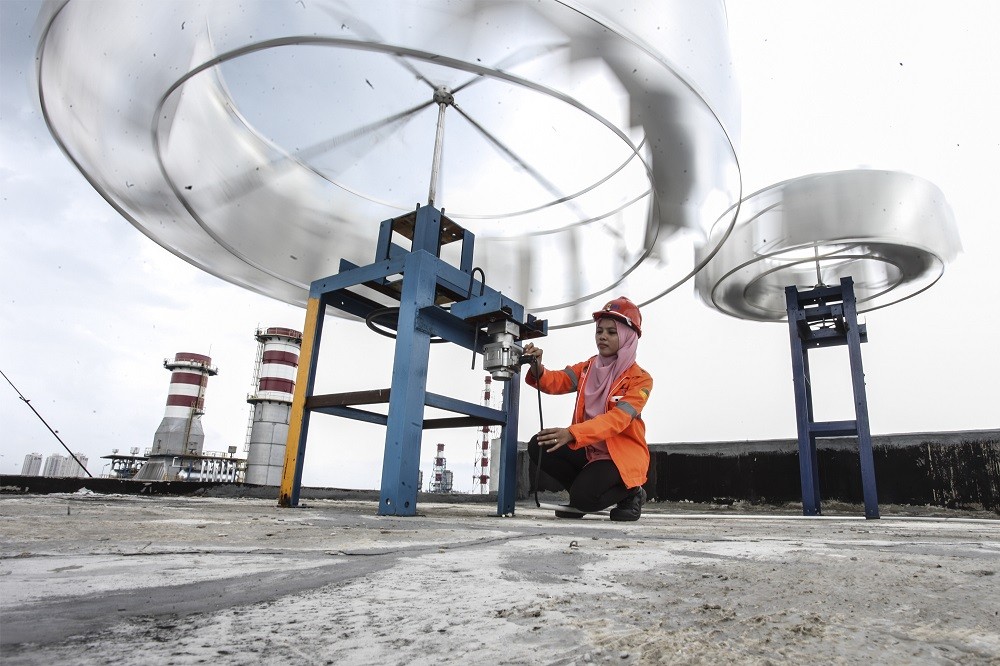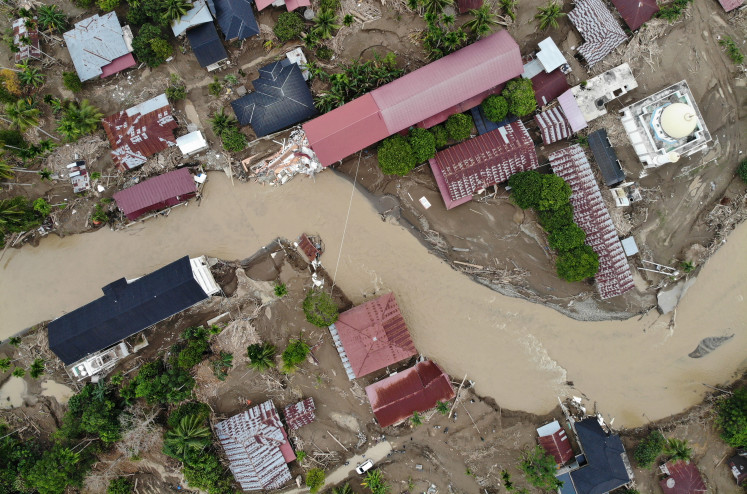Popular Reads
Top Results
Can't find what you're looking for?
View all search resultsPopular Reads
Top Results
Can't find what you're looking for?
View all search resultsRenewables and development
Like other parts of the world, Indonesia is steadily urbanising. By mid-century, 70 percent of its citizens will be living in an urban environment. In population terms, this means that over the next three decades some additional 90 million Indonesians will make their lives in this manner.
Change text size
Gift Premium Articles
to Anyone
O
ver the past month I have experienced an interesting immersion in what is going on in renewable energy developments in the UK, paraphrased early in meetings with two clever young Indonesians underaking PhDs at Glasgow University.
One is making a contribution to geothermal field mapping and the other in coal to liquid transformation.
I also learned of ongoing research advancing capabilities in the area of solar storage which will lead to 24/7 capability and read an interesting article in a serious science journal reporting the results of decades of careful observation work based on 25 satellites, carried out by two distinguished institutions.
The outcome of this was that the 0.7 degree Celsius average rise in the temperature of the Earth since 1850 could be assigned to solar activity to a 97 percent degree of accuracy.
The Sun is’king’ of our environment and has very largely shaped our planet and energy resources. It is exciting that we are learning more and more how to use its energy directly, as well as continuing indirect approaches through application of its impact on our water environment and the hidden energy to be found below the surface.
As it is well known, Indonesia is well-blessed with a whole range of fossil and non-fossil fuel sources of energy. It is necessary to make more use of the considerable resources of coal for the economic heartland of the country for the immediate critical need to address the current energy gap, but worth noting that technology now exists for improving the quality of low grade coals to significantly reduce the impact of harmful gases in electricity production.
Nevertheless, there is no reason to hold back on developing and installing the large portolio of projects using the country’s significant sources of renewable energy. In the renewable portfolio, identified already are 76 GW of potential hydro power, 29 GW of geothermal energy sources and very considerable availability of solar solutions, never mind other specific projects in bio-related or waste to energy opportunities. In addition, the archipelago structure of the country can provide many GW of power from application of ocean tidal energy projects.
While location would mitigate against building a number of hydro or geothermal projects, from those that are viable there is a workable portfolio of some 45 GW of renewable energy. Ocean-energy related projects being developed now and over a period of time could supply up to a further 10-15 GW once the ocean energy resource potential has been fully explored adn harnessed in accordance with well-established with environmentally friendly criteria.
The solar resource is huge and projects are quickly installed, offering bespoke solutions to areas that are difficult to access and thus able to make a significant contribution to many parts of the archipelago, which are currently energy deprived.
It is not unreasonable and very achievable to plan for the country to have up to some 60 GW of its energy supplied by renewable resources over the next two decades. The question is how quickly the government can set about facilitating the enabling policies, laws and regulations for this to happen, taking account of world norms in the financing of renewable projects. While there is a genuine willingness to push the renewable envelope much needs to be done to ensure that the target of 25 percent of electricity production is comprised of a mix of proven, available renewable energy technologies by 2025.
Like other parts of the world, Indonesia is steadily urbanising. By mid-century, 70 percent of its citizens will be living in an urban environment. In population terms, this means that over the next three decades some additional 90 million Indonesians will make their lives in this manner.
Greater Jakarta is projected to expand from today’s 31 million to 50 million people, then to become the world’s largest urban center, but what about the other 70 million that will not be Jakarta based.? This is where the plan to develop many other urban centers across the archipelago is important, for example the 100 Cities program being promoted by Darmono, the Chairman of the Jababeka Group.
Simply, we need to work hard in the years ahead to use the nucleus of small towns and smaller centers as the units from which we can develop sustainable, environmentally stable commnities across the archipelago. This will require full government support and private sector drive, but each of these centres should be taking ownership and responsibility for their own success as Smart Cities of the future.
Here one should return to the theme of encouraging the use of renewable and clean energy solutions as much as possible and the opportunity that this provides in linking the needed approach to urbanisation and the application of renewable solutions to a cleaner environment. Will this get strong government support?
We have also entered the 4th Industrial Revolution, the Cyber Age, very much linked to urbanization and which lends itself strongly to support through clean energy solutions, such as electric powered vehicles which are already appearing in markets. Future professionals and technocrats need to start embracing the challenges that all this brings, with universities and technical colleges making the transformation as seamless as possible, building on the technical developments of the past and working closely with industry leaders to fulfil the promise that is evolving.
***
The writer is international chancellor at President University; director at Nusantara Infrastructure and honorary research fellow at Glasgow University.
---------------
We are looking for information, opinions, and in-depth analysis from experts or scholars in a variety of fields. We choose articles based on facts or opinions about general news, as well as quality analysis and commentary about Indonesia or international events. Send your piece to community@jakpost.com. For more information click here.










